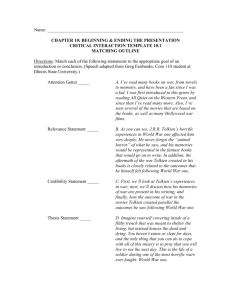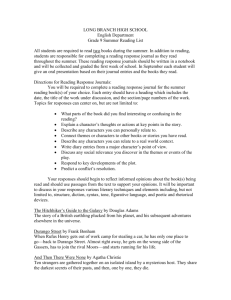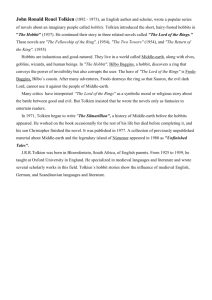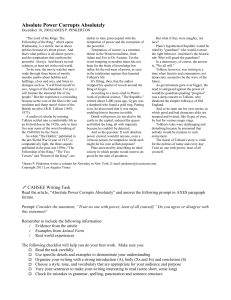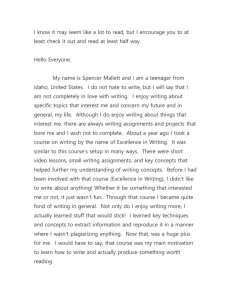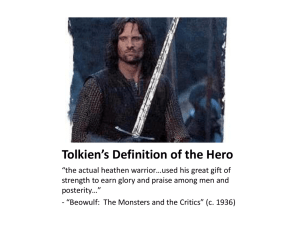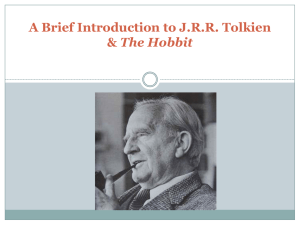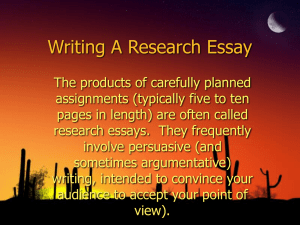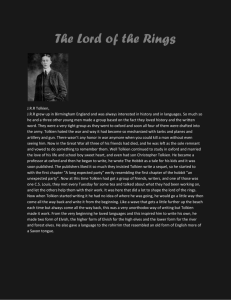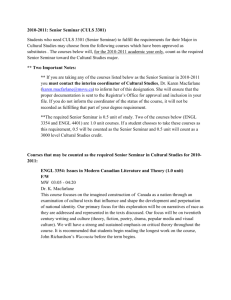January
advertisement
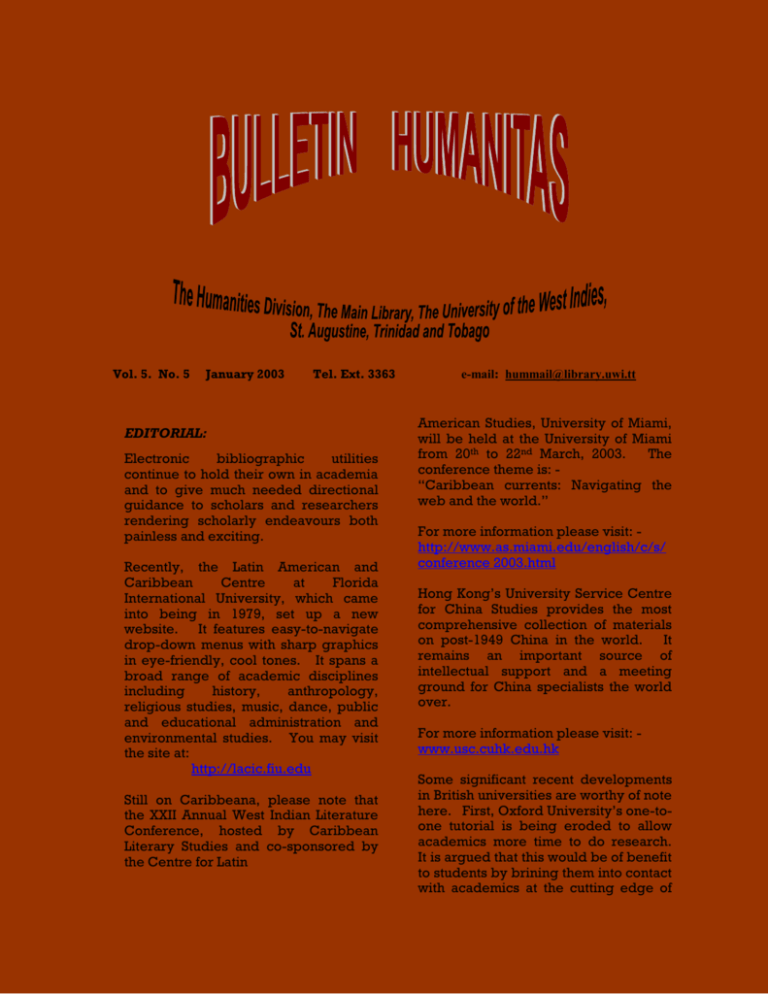
Vol. 5. No. 5 January 2003 Tel. Ext. 3363 EDITORIAL: Electronic bibliographic utilities continue to hold their own in academia and to give much needed directional guidance to scholars and researchers rendering scholarly endeavours both painless and exciting. Recently, the Latin American and Caribbean Centre at Florida International University, which came into being in 1979, set up a new website. It features easy-to-navigate drop-down menus with sharp graphics in eye-friendly, cool tones. It spans a broad range of academic disciplines including history, anthropology, religious studies, music, dance, public and educational administration and environmental studies. You may visit the site at: http://lacic.fiu.edu Still on Caribbeana, please note that the XXII Annual West Indian Literature Conference, hosted by Caribbean Literary Studies and co-sponsored by the Centre for Latin e-mail: hummail@library.uwi.tt American Studies, University of Miami, will be held at the University of Miami from 20th to 22nd March, 2003. The conference theme is: “Caribbean currents: Navigating the web and the world.” For more information please visit: http://www.as.miami.edu/english/c/s/ conference 2003.html Hong Kong’s University Service Centre for China Studies provides the most comprehensive collection of materials on post-1949 China in the world. It remains an important source of intellectual support and a meeting ground for China specialists the world over. For more information please visit: www.usc.cuhk.edu.hk Some significant recent developments in British universities are worthy of note here. First, Oxford University’s one-toone tutorial is being eroded to allow academics more time to do research. It is argued that this would be of benefit to students by brining them into contact with academics at the cutting edge of 2 their disciplines, and that it is in the general interest of Oxford to allow more time for world-class research. The future of the University of London is in doubt after King’s College, London, announced its plans to seek its own degree-awarding powers. The move came after King’s learnt of the merger between Imperial College, London (which has already applied for degreeawarding powers, which it expects to receive shortly), and University College, London. Under government proposals to be put forward this year, British Universities will scrap traditional degree classifications in favour of a US-style average points score and a detailed transcript of achievement. In the Author’s Corner of this issue we present the chronology of J.R.R. Tolkien. R. Clarke Editor ▒▒▒▒▒▒▒▒ ACQUISITIONS for the month of January totaled TITLES in the following subject areas: - 206 E North American History F South/Central America and Caribbean History L Education M Music N Visual Arts P Linguistics PA Greek/Latin Language and Literature PB, -PE Celtic/Romanic/ Germanic Language PG Russian /Spanish Language Literature PJ,PK Oriental Language & Literature PL African Language & Literature PM Creole/Indian Language PN Literary Criticism, Mass Media PQ French Language and Literature PR English and West Indian Literature PS - PZ American Literature & European Literature Z4- Z8387 Library Science Z Bibliographies ZA Internet Total: - ▒▒▒▒▒▒▒▒ 6 10 7 2 8 4 15 1 2 3 6 19 30 7 8 4 2 206 ▒▒▒▒▒▒▒▒ Interesting TITLES include: - Call No. Subject Area AC B-BD; BG-BJ BL-BX CC D-DP DS DT Amount General Information Philosophy Religion Archaeology European History Eastern History African History 6 7 1 19 14 25 African modernities. Entangled meanings in current debate/ edited by Jan-Georg Deutsch et al, 2002. This inter-disciplinary collection, from history to anthropology and sociology to philosophy, brings some of these wider issues and 3 controversies to bear upon African studies. [Call no. DT3. A47 2002] Baudelaire and the poetics of modernity/ edited by Patricia A. Ward, 2001. “The essays in this volume examine Baudelaire’s poetics and complex relationship between the poet and his twentieth century literary heirs, including René Char, Yves Bonnefoy and Michel Deguy.” [Call no. PQ2191. Z5 B358 2001] The complete short stories of Marcel Proust. Compiled and translated be Joachim Neugroschel, 2001. “In The Complete Short Stories of Marcel Proust, award-winning translator Joachim Neugroschel offers readers a new translation of Pleasures and Days, the first in over fifty years, and one that fully renders the vitality and delicate irony of the original French.” E.A. Monteith Richards, 2002. and Glen “This collection of eighteen original essays considers aspects of Jamaican history not covered in more general histories of the island, and illuminates more recent developments in Jamaican and West Indian history.” [Call no. F1881 J35 2002] Jorge Amado. New critical essays/ edited by Kenneth H. Brower et al, 2001. “Although, as his critics maintain, Amados work may be flawed and, at times, even crippled by various faults, he remains an optimistic and forward-looking artist/intellectual, one who continues to exert a progressive force in both Brazilian fiction and Brazilian culture.” [Call no. PQ9697. A647 Z465 2001] Making Callaloo. 25 years of Black Literature/ edited by Charles Henry Rowell, 2002. [Call no. PQ2631. R63 A265 2001] “A truly compelling collection of poetry and fiction by some of the most influential names in Black literature today, all previously published within the pages of the literary journal Callaloo.” Historia de la literatura hispanoamericana. I. De los orígenes a la Emancipacion/ par Jose Miguel Oviedo, 1995. [Call no. PQ7081.085 1995. Vol. 1] Jamaica in slavery and freedom. History, heritage and culture/ edited by Kathleen [Call no. PS508. N3 M28 2002] The Maroon narrative. Caribbean Literature in English across boundaries, ethnicities and centuries/ by Cynthia James, 2002. 4 “Few scholars would disagree that not merely a dialogism, but a continuity exists on either side of the colonial/postcolonial divide. It is this dialogism and this continuity that The Maroon Narrative seeks to highlight without pre-empting the longstanding pre-occupation with the literature of the last fifty years.” ▒▒▒▒▒▒▒▒ New issues of the following JOURNALS contain important and helpful articles: [Call no. PR9205. J35 2002] African Affairs. Vol. 101, No. 405, October 2002 - In “Justice denied: political violence in Kwazulu – Natal after 1994” Rupert Taylor presents three case studies “to unravel post-apartheid violence in Kwazulu – Natal, South Africa – the Shabashobane massacre (1995); the Richmond killings (1997-98); the Norgoma assassinations (1999-2000). - “Oxfam sought to reduce the technical aspects of development to a secondary consideration, and hence failed to analyze adequately the material and physical impact of its and the government’s development policy.” So concludes Michael Jennings in “ ‘Almost an OXFAM in itself’: OXFAM, UJAMAA and development in Tanzania”. Problem of the century. Racial stratification in the United States/ edited by Elijah Anderson and Douglas S. Massey, 2001. “In 1899, the great African American scholar, W.E.B. Du Bois, published The Philadelphia Negro – the first systematic study of an African American community. Problems of the Century reflects upon his prophecy, exploring ways in which the ‘colour line’ is still visible in America.” [Call no. E184. A1 P74 2001] V.S. Naipaul: An introduction/ by Yashoda Bhat, 2000 “The recent concept of New Literatures in the English Language is still a new one and has not gained sufficient currency and popularity. An introduction to the context of these literatures, the geographical, cultural and historical background becomes useful when commencing the study of the authors from such regions. The book V.S. Naipaul: An introduction provides such a background to V.S. Naipaul.” [Call no. PR9272.9. N32 Z574 2000] [Call no. DT1 J86 R8] ARIEL. Vol.32, No. 3, July 2001 - “One pressing historical problem and modern cultural crisis that “Frankenstein’s” interpreters have largely overlooked, however, is that of British imperial slavery and its aftermath.” So notes John Clement Ball in “Imperial monstrosities: “Frankenstein”, the West Indies and V.S. Naipaul.” - “In the Caribbean context, the history – determining 5 “encounter” is most often defined as that by European, the Old World, in an event-creating meeting with the New World.” So notes Evelyn Hawthorne in “Persistence of (Colonial) memory: Jean Rhys’s Carib texts and imperial historiography.” [Call no. P11. S83] In this issue you will find: - [Call no. PR1. A698] - “Trinitarian unity in Latentation de Saint Antoine” by Allan H. Pasco. English. Vol. 51, No. 201, Autumn 2002 - In “Whose Jerusalem? – Prophecy and the problem of destination in Geoffrey Hill’s Canaan and Churchill’s Funeral Marcus Waithe observes that “critics have for long emphasized the ‘historical’ qualities of Geoffrey Hill’s verse; they have dwelt on his preoccupation with the past, on his attempts to combine a representation of the dead with an insistent criticism of the very wish to commemorate.” - “Remaining human: Robert Antlme’s L’espece humaine” by Martin Crowley. - “Other than becoming: Jean Rouch and the ethnics of Les maitres fous” by Sarah Cooper. [Call no. PQ1. F6] The Journal of Asian Studies. Vol. 61, No. 3, August 2002 - [Call no. PR1. E58] French Studies. Vol. LV1, No. 4, October 2002 Studies in Second Language Acquisition. Vol. 24, No. 4, December 2002 In this issue you will find: - “The compounding parameter in second language acquisition” by Roumyana Slabakova. - “Morphological and syntactic transfer in Child L2 acquisition of the English dative alteration” by Melinda Whong-Barr and Bonnie D. Scwartz. - “Form-meaning mapping in vocabulary acquisition in a second language” by Nan Jiang. In “Subjects selves, and the politics of personhood in Theravada Budhism in Nepal”, Lauren G. Leve concludes that “the political vicissitudes of Theravada Budhists in Nepal illustrate a history of competition between Theravada Budhists and the Hindu state in their parallel concerns to fashion subjects and citizens.” [Call no. DS1 J86 A8] Journal of Latin American Studies. Vol. 34, part 3, August 2002 In this issue you will find: - “New help or new hegemony? The translational indigenous 6 people’ movement and ‘being Indian’ in El Salvador” by Virginia Q. Tilley. - “Imaging El Ser Argentino: cultural nationalism and romantic concepts of nationhood in early twentieth century Argentina” by Jeane H. Delaney. - “The politics of pension reform in Latin America” by Camelo Mesa-Lago and Katharina Muller. [Call no. F1401. J86 L3] J.R.R.Tolkien Kunapipi. Vol. XXIV, Nos. 1 & 2, 2002 This is a special issue of post-apartheid South Africa. In the words of its Editor, Kunapipi “has been impressed by evidence of a creative energy that has clearly risen to meet the demands of a nation ‘at the cross-roads’ and a freedom that is yet to be fully realized.” John Ronald Reuel Tolkien [Call no. PR9080. A1 K96] 1894 1891 1892 ▒▒▒▒▒▒▒▒ 1895 CHRONOLOGY 1896 1900 1901 1902 Mabel Suffield moves to Africa to marry Arthur Tolkien, English manager of a bank in Bloemfontein, South Africa. John Ronald Reuel Tolkien is born. His younger brother, Hilary Arthur Reuel is born. Mabel with children returns to England and live with her relatives in Birmingham, waiting for Arthur. Arthur Tolkien dies in Africa. Mabel with sons moves outside Birmingham, to Sarehole. Mabel begins to teach Ronald Latin, French, German, drawing, painting and handwriting. Mabel Tolkien becomes Catholic and converts her sons. Ronald enters King Edward VI School, and they move back to Birmingham. They move to a villa behind King's Health Station They move to a suburb of Edgbaston. Ronald enrolls at St. Phillip's Grammar School. 7 1903 Tolkien returns to King Edward's, where he becomes a scholarship student and learns Middle English and Greek. 1904 Mabel Tolkien dies. A parish priest Father Francis Morgan becomes guardian for the Tolkien brothers. 1905 Tolkien and brother live with Aunt Beatrice. 1906-11 Tolkien privately studies Old English, Old Norse, and Gothic, begins to invent languages with their own grammars and histories, and writes poems, some in invented languages. 1908 Tolkien brothers are moved to Mrs. Faulkner's boardinghouse. Edith Bratt, also an orphan, is there. 1909 That autumn Father Morgan discovers the romance between Ronald and Edith, which he fears may lead to early marriage and ruin Tolkien's career prospects. Tolkien fails to win an Oxford scholarship. 1910 Father Morgan moves the boys. Ronald is forbidden to contact Edith until he is twenty-one. She leaves Birmingham. Ronald speaks Gothic and Old English in a school debate. He is awarded a small scholarship to study classical languages at Exeter College, Oxford. He also learns some Old Norse and Spanish. 1911 Creates the Tea Club and Barrovian Society at grammar school. Begins the study of comparative philology under Joseph Wright, joins and camps with a cavalry regiment, reads a paper on the Kalevala (a Finnish mythological epic), writes poems. 1913 Turns twenty-one, contacts Edith Bratt. She breaks engagement to another man. He takes a Second Class in exams and transfers from classics to English, with emphasis on philology, and formally studies Old Norse. 1914 Edith converts to Catholicism, and they are formally engaged. Britain declares war on Germany. Tolkien decides to complete his degree before serving. 1915 Receives First Class Honours on final examination; takes a commission, and begins army training. Continues to write poetry in "fairy language" and English, including the anthologized "Goblin Feet." 1916 Marries Edith Bratt on 22 March, leaves for France on 4 June, and participates in the Battle of the Somme. Is stricken with "trench fever," returning home on 8 November. 1917 Convalescing begins The Book of Lost Tales--the first draft of what later will be called The Silmarillion, specifically, The Fall of Gondolin. The first son, John, is born. 1918 Accepts a position as a junior staff member of the New English Dictionary that is later called Oxford English Dictionary at Oxford and works in the letter "w." 1920 Begins The Father Christmas Letters. The second son, Michael, is born. Appointed Reader in English Language at Leeds University. 1922 Publishes a Middle English Vocabulary. Begins work on the new edition of Sir Gawain and the Green Knight with E.V. Gordon. 1924 Appointed Professor of English Language at Leeds. The third son, Christopher, is born. 1925 The Sir Gawain... is published. Moves from Leeds to Oxford where he is elected Rawlinson and Bosworth Professor of AngloSaxon. 8 1926 1928 1929 1930 1932 1934 1936 1937 1938 1939 1943 1944 1945 Forms "The Coalbiters," a faculty club reading Old Norse. Meets C.S. Lewis. Writes the first sentence of The Hobbit (other sources indicate that it happened in 1930 or 1931). His daughter, Priscilla, is born. Completes full draft of The Silmarillion (printed in The Shaping of Middle-earth, 1986). Tolkien shows the manuscript of The Hobbit to C.S. Lewis. Receives two-year Leverhulme Research Fellowship. Delivers lecture, "Beowulf: The Monsters and the Critics,", before British Academy. Publishers Allen and Unwin read the Hobbit manuscript and suggest that he complete it. The Hobbit is a commercial and critical success. Unwin asks for a sequel. Tolkien submits Father Christmas Letters and The Silmarillion, but they are rejected. In December, he writes first chapter of "New Hobbit," which will become The Lord of the Rings. Expands Farmer Giles of Ham manuscript to book length. The Hobbit published in the US and receives New York Herald Tribune award as best children's book of the season. Drafts twelve chapters of The Lord of the Rings. Lectures "On Fairy Stories" at St. Andrew's University. Sixteen chapters of the sequel written. Son Christopher enters the Air Force. Tolkien writes long letters to Christopher, and sends him chapters of The Lord of the Rings, now into book 5. Leaf by Niggle is published in the Dublin Review. Tolkien elected Merton Professor of English Language and Literature and says 1947 1948 1949 1950 1951 1952 1954 1955 1956 1959 1962 1963 1964 1965 he is putting The Lord of the Rings "before all else". Notes discrepancies between The Hobbit and its sequel, particularly as to the nature of the ring. "On Fairy Stories" is published. The Lord of the Rings is completed (according to other sources the year is 1950). Farmer Giles of Ham is published. Negotiates with Collins, a London publisher, to publish The Silmarillion along with the hobbit sequel. Farmer Giles sells slowly. Revised edition of The Hobbit published. Collins returns manuscripts. Tolkien agrees to allow Allen and Unwin to publish The Lord of the Rings without Silmarillion. First two volumes of The Lord.... is published. The Return of the King is published. Tolkien ceases to meet regularly with Lewis. Rings are translated into Dutch: during the next 20 years it will be translated into Swedish, Polish, Danish, German, Italian, French, Japanese, Finnish, and, the last but not least, Russian. Retires from the Merton professorship. Tolkien publishes The Adventures of Tom Bombadil and his edition of the Middle English Ancrene Wisse. C.S.Lewis dies on 22 November. Tree and Leaf is published. An unauthorized Ace paperback edition of Rings, the first inexpensive edition, triggers sudden popularity of Tolkien on college campuses and attention from the press. There is a legal conflict over publishing rights. An authorized revised edition issued by Ballantine is a best 9 1966 1967 1968 1970 1971 1972 1973 1977 1978 seller. Tolkien Society of America is founded. A revised, third edition of The Hobbit is published. A collection of earlier stories and essays, The Tolkien Reader is published in America. Smith of Wootton Major is published. Poems and Songs of Middleearth, a record of Tolkien's poems in English and Elvish set to music, is issued. The Tolkiens move to Poole, near Bornemouth, a seaside resort. The staff of the Oxford English Dictionary compiles an entry for "hobbit". Edith Tolkien dies on 29th November, aged eighty-two. Tolkien returns to Oxford, with rooms at Merton College. Receives honorary doctorate from Oxford University and is made a Commander of British Empire. Visiting friends in Bornemouth, becomes ill and dies a few days later, on 2nd September, at eighty-one years of age. His son Christopher, as literary executor, is left to complete The Silmarillion The Silmarillion is published with the aid of Christopher. The first Russian translation of Tolkien (The Hobbit) is published. FEATURES FORM THE SCHOOL OF EDUCATION LIBRARY [Call No. LB1139.35 A37 I86 2001] Defining and redefining gender equity in education/ Edited Janice Koch and Beverly Irby. Information Age Publishing, 2002 [Call No. LC1752 D45 2002] Guided comprehension: A teaching model for grades 3-8/ Maureen McLaughlin and Mary Beth Allen. International Reading Association, 2002 [Call No. LB1573.7 M35 2002] Smart discipline for the classroom: Respect and cooperation restored/ Larry Koenig. Corwin Press, 2000 [Call No LB3012.2 K64 2000] Widening the circle: Including children with disabilities in preschool programs/ Edited Samuel L. Odom. Teachers College Press, 2001 [Call No. LC4019.2 C36 2001] ARTICLES OF INTEREST IN JOURNALS 1. Helping boys succeed/ Deborah Taylor and Maureen Lorimer. Educational Leadership, 60(4), Dec. 2002Jan. 2003. For the month of January, the Library received twenty-one (21) new books. Some of the new titles are: - This article gives some strategies for increasing boys’ motivation. Creative expression and play in early childhood/ Joan Packer Isenberg and Mary Renck Jalongo. Merrill Prentice Hall, 2001 2. Integrating technology with the teaching of an early literacy course / Lesley Mandel Morrow et al. The 10 Reading Teacher, November 2002 56(3), This article describes an early literacy course which uses many kinds of technology to improve teaching and learning. 3. Solving problems together: The importance of parental/ school/ community collaboration at a time of educational and social change/ Dora Mathews and Rosanne Menna. Education Canada, 43(1), Winter 2003. This article looks at the value of school/ family and community partnerships which have a positive effect on students’ learning and benefit all involved. 4. Teaching kids to control anger/ Robert E. Glenn. The Education Digest, 68(3), November 2002 The article looks at ways in which teachers and counselors can assist students in controlling their anger and channeling it in a positive way. THINGS OF INTERST TO TEACHERS AND EDUCATORS WEBSITES www.readwritethink.org On this website teachers can discover new ways to engage students in reading and language arts. www.new-teachers.com A resource site for new and potential teachers with information on the profession. DISPLAYS IN THE LIBRARY From 13-24th January, 2003, the Library displayed its audio- visual collection. The display generated a lot of interest. OTHER Beginning January16, 2003, the Library received a one-month free trial of the Silver Platter Wilson Education Abstracts Full Text Database. Janet Fullerton-Rawlins Librarian II
